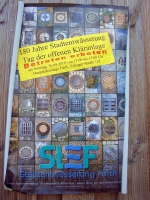I have just finished reading Freedom, by Jonathan Franzen (which also came out in German, rushed onto the market in a version by two translators). It’s very good, but I’m not really interested in what is the Great American Novel.
Now I wonder where the promised German element is. Franzen is said to have told MayBritt Illner that some of the novel would be set in Germany, but it isn’t. Germerica:
The 49-year old author of The Corrections says what he loves most of Berlin are its parks where he intends to spend a lot of time. “The Federal Republic will play an important role in the novel,” he told TV moderator Maybrit Illner as reported in the Berlin daily Berliner Morgenpost.
The only reference I saw was to a German called Matthias Dröhner who leaves a voice message asking Richard Katz to give him an interview.
The first (message) was from a pesty German, Matthias Dröhner, whom Katz vaguely recalled having struggled to fend off during Walnut Surprise’s swing through the Fatherland.
There’s a lot of information on the Web about Franzen and Germany. Apparently he studied science and filled up with German credits, since German was regarded as the language of science (that certainly used to be the case forty or fifty years ago). He spent two years in Germany in the early 1980s, which cured him of his desire to live in Europe. He is working on translating Karl Kraus essays into English.
There’s a 2005 interview with Franzen on Perlentaucher/signandsight, in English and German. Here Franzen talks about the influence German literature had on him – something I haven’t really noticed, except, slightly, for Thomas Mann.
Meine literarischen Vorbilder sind deutsch: Kafka die Nummer eins, dann Karl Kraus, Goethe, Thomas Mann. Sie alle waren mir ungemein wichtig. Einiges in der 27sten Stadt, auch einiges in den satirischen Passagen von Schweres Beben ist von Karl Kraus gestohlen. Thomas Manns feine Ironie gefiel mir immer sehr gut. So habe ich mich lange als eine Art deutscher Schriftsteller betrachtet.
My literary models were mostly Germans. Kafka was the number one person, and then, two years later, Karl Kraus. Much of the tone of “The Twenty-Seventh City”, but also some of the satiric passages of “Strong Motion” are stolen from Karl Kraus. Thomas Mann had a very fine irony which I found very sympathetic. So, all along, I’ve considered myself a kind of a German writer.
In another interview in Der Tagesspiegel earlier this year (German, English), Franzen talks about the German language.
Das Bild, das mir für die deutsche Sprache in den Sinn kommt, gleicht einer jener riesigen chinesischen Fabriken, die dem Arbeiter alles bieten: ein Kino, einen Volleyballplatz, Schlafsäle – eine ganze Firmenstadt, in der alles vernünftig angeordnet ist. In den englischen Gebäuden, so kommt es mir vor, geht man viel seltener mit dem Staubsauger durch. Die Fenster werden nicht so oft geputzt, der Schmutz hängt in den Ecken. Vor allem das gegenwärtige Amerikanisch kommt mir vor wie ein großes unordentliches Studentenwohnheim.
The image of the German language that springs into my mind resembles one of those enormous Chinese factories that provide everything for their workers: a cinema, a volleyball court, dormitories – a complete corporate city in which everything is rationally laid out. The vacuum cleaner is used less frequently in English houses – at least, that’s how it seems to me. The windows are not cleaned as often and there’s dirt hanging in the corners. Contemporary American in particular seems to me very much like a large untidy student dorm.






